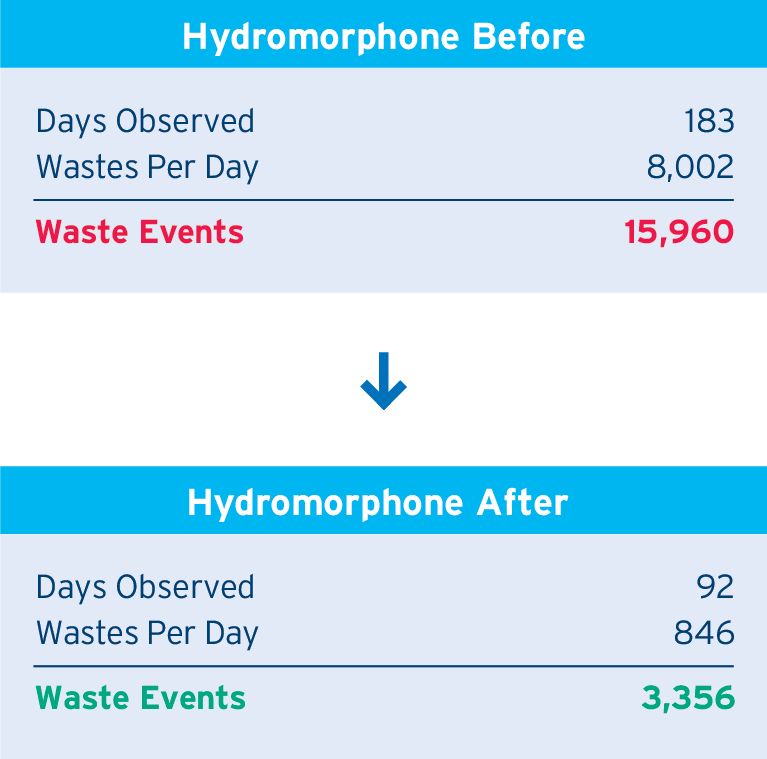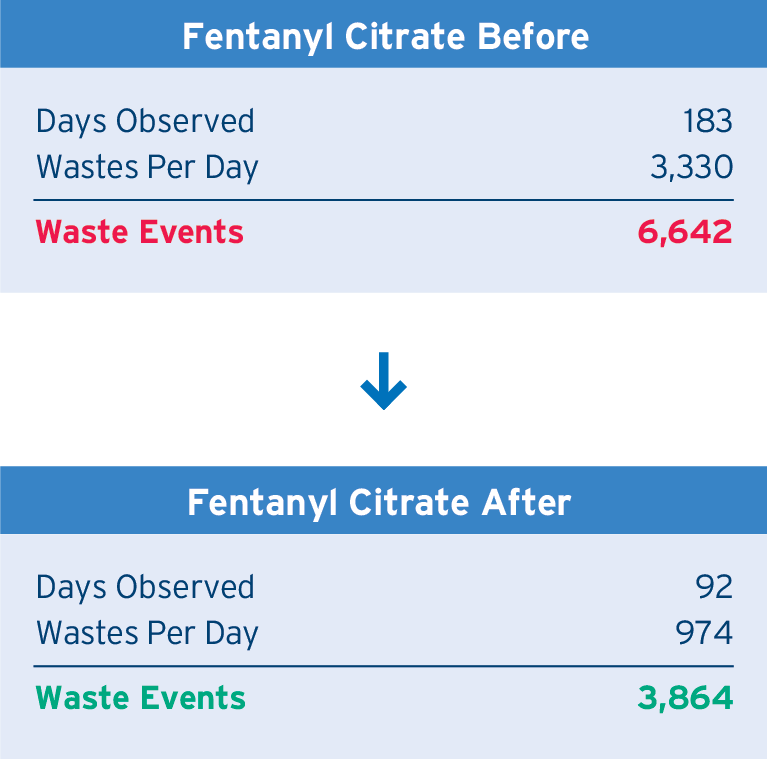Reducing Waste with Ready-to-Administer Prefilled Syringes: A Health-System Implementation
Baptist Health
Disclaimer: Testimonials and data that appear on this case study are provided by real clients. Case Studies describe our past work on real cases, but our past performance in a specific case is no guarantee or representation of the likelihood that you will prevail in your case if you use our products or services.

79%
Reduction in overall hydromorphone HCl waste events*

42%
Reduction in overall fentanyl citrate waste events*
The Challenges
- Lack of dosage form standardization for IV push opioids
- Inefficient clinician workflows related to dispensing and wasting controlled substances
The Solution
- Use Simplist MicroVault® ready-to-administer prefilled syringes to more closely match clinical practice for commonly used IV push opioids
- Utilize Simplist MicroVault Cassettes in Omnicell’s Controlled Substance Dispenser to reduce countbacks of new prefilled syringes
The Impact
- Decreased hydromorphone and fentanyl waste by 79% and 42%, respectively, resulting in fewer opportunities for diversion*
- Simplified the IV push workflow with fentanyl citrate, hydromorphone HCl, and morphine sulfate in secure packaging
- Reduced time nurses spend counting and wasting controlled substances
*Data provided by Bluesight on behalf of Middlesex Health and analyzed by Fresenius Kabi’s Simplist Support Team.
Introduction
Baptist Health is a full-spectrum health system dedicated to improving the health of its communities. Founded in 1924 in Louisville, Kentucky, the Baptist Health family consists of nine hospitals and more than 400 points of care. Baptist Health employed provider network, Baptist Health Medical Group, has nearly 1,500 providers, including more than 750 physicians and more than 740 advanced practice clinicians. Baptist Health’s physician network also includes more than 2,000 independent physicians.
Fresenius Kabi USA is a global, integrated pharmaceutical company dedicated to bringing lifesaving medications and solutions to clinicians. For more than 100 years, the company has been a leader in providing high-quality, affordable medications for chronically and critically ill patients.
The Challenge
The use of intravenous (IV) medications is essential to providing patient care in the hospital setting.1 While administering medications via the IV push route may seem like a straightforward everyday process, it actually carries a high potential for patient harm due to the number of complex manipulations required to administer, compatibility concerns, narrow therapeutic indexes, and challenges with reversing pharmacologic effects of drugs administered by this route.1 ISMP recommends providing adult IV push medications, to the greatest extent possible, in a ready-to-administer (RTA) form (to minimize the need for manipulation outside of the pharmacy sterile compounding area).1 An RTA product may reduce the complexity of IV push administration, thus decreasing the likelihood of an error occurring.
Baptist Health recognized the advantages of simplification and decided to standardize to an RTA presentation for several commonly used IV push opioid medications. The Joint Commission revised its pain standards in 2018 to include a leadership standard that reads, “A hospital has a leader or leadership team that is responsible for pain management and safe opioid prescribing and develops and monitors performance improvement activities.2 By adopting an RTA syringe in secure, tamper-evident packaging, the leadership team believed they could meet their objective of optimizing the clinical workflows surrounding the delivery of IV push morphine, hydromorphone, and fentanyl while reducing the risk of diversion.
“Having a ready-to-administer syringe has helped me work more efficiently. I don’t have to spend as much time drawing up doses or wasting medication, which allows me to focus on my patients.”
Jay Smith, BSN, RN — Interventional Radiology, Baptist Health Floyd
The Solution
Reduction in Narcotic Waste
Health-system policies and procedures for handling and disposing of controlled substances vary.3 Wasting excess medication requires clinicians to dedicate significant time to a process that adds no value to patient care. To better understand what impact reducing narcotic waste could have, Baptist Health partnered with Fresenius Kabi’s Medication Technology & Analytics (MTA) team for a complimentary analysis. Fresenius Kabi’s MTA team of pharmacists was able to quantify controlled substance waste, labor inefficiency, and automated dispensing system storage space to develop a customized solution to support each hospital with the implementation of the new syringes.
One of the tools used to accomplish this was a narcotic waste calculator developed using A Continuous Observation Workflow Time Study to Assess Intravenous Push Waste3 as a framework. In the study, the authors concluded that significant financial costs are associated with wasting product and skilled labor time. Optimizing product size, taking special note to match product availability with common practice use, would reduce the financial burden placed on health systems.3
Conclusions drawn from the study, in addition to the waste calculator results, supported Baptist Health’s decision to implement Simplist MicroVault prefilled syringes in sizes that more closely match what is ordered in their hospitals. They understood that this combination had the potential to reduce product waste, resulting in fewer opportunities for diversion.
Automation of Controlled Substance Dispensing
Dispensing Baptist Health was also seeking novel ways to automate time-consuming operational tasks that inhibit clinicians from spending more time with patients. Required countbacks of controlled substances at the automated dispensing cabinet (ADC) was one task they thought could be targeted for improvement.
Omnicell’s Controlled Substance Dispenser (CSD) is an automated unit-dose narcotic dispensing system that ensures nurses’ access to the selected dose for their patient, thus eliminating the need for countbacks. The CSD provides a simple and fast controlled substance workflow, which can save hours of nursing time each day.4 To improve dispensing workflows, they incorporated new cassettes designed specifically for Simplist MicroVault prefilled syringes into their CSD.
“Adopting the Simplist platform in several of our opioid offerings was a win/win proposition. Having ready-to-administer syringes in our most commonly prescribed doses means less time is spent wasting critical medications, which saves nursing time and reduces opportunities for diversion within the organization.”
M. Brandon McLain, PharmD, BCPS, MBA — Director of Pharmacy Operations, Baptist Health
The Results
Reduction in Narcotic Waste
To illustrate the impact of implementing these initiatives, Baptist Health leveraged the results from Baptist Health Floyd, a mid-sized hospital within their network of nine locations. By converting IV push administration of commonly used opioid medications to the Simplist MicroVault platform, pharmacy leaders at Baptist Health were able to accomplish their standardization goals while simultaneously making system-wide opioid stewardship performance improvements. Adding products that more closely aligned with clinical practice reduced hydromorphone and fentanyl waste by 79% and 42%, respectively. This change resulted in improved workflows for nursing and pharmacy while significantly reducing time spent wasting.
WASTE DATA OBSERVED: PRODUCT OPTIMIZATION OPPORTUNITIES
In addition to reducing narcotic waste, Baptist Health also improved the process of dispensing the new syringes by using Simplist MicroVault cassettes for Omnicell’s Controlled Substance Dispenser. Simplist MicroVault tamper-evident packaging gave pharmacy leadership peace of mind knowing they were securely dispensing drugs with the highest abuse potential. Combining single-dose dispensing with products that more closely match common practice allowed Baptist Health to decrease opportunities for diversion and reduced waste in three ways:
- •Physical amount of drug needing to be wasted
- •Required time of two healthcare professionals to waste excess drug
- •Time spent counting controlled substances and reconciling waste
Providing an Implementation Roadmap
Streamlining Storage of Simplist®
System-wide change can be a challenge if leadership doesn’t have staff buy-in. To ensure a seamless rollout, pharmacy staff collaborated with Fresenius Kabi’s Medication Technology & Analytics team to leverage their storage optimization tool, Optilytics. The results provided a roadmap to incorporate the syringes into ADCs simply and efficiently.
Clinical Education
Baptist Health also wanted to be sure every clinician who administers IV push medications was comfortable using the new syringes. Therefore, a new competency was added to the hospital’s online training solution, requiring all new hires to review the Simplist Instructions for Use training video prior to using the product.
Fresenius Kabi was able to support the health system by providing an efficient roadmap to implement the products and provide training that ensured clinicians were confident when using Simplist. By partnering with Fresenius Kabi, Baptist Health was able to reduce diversion risk and improve clinician workflow, which ultimately resulted in more time for patient care.
Let's reduce narcotic waste together
Schedule a call with our Pharmacy Analytics team for a custom analysis
Contact us
